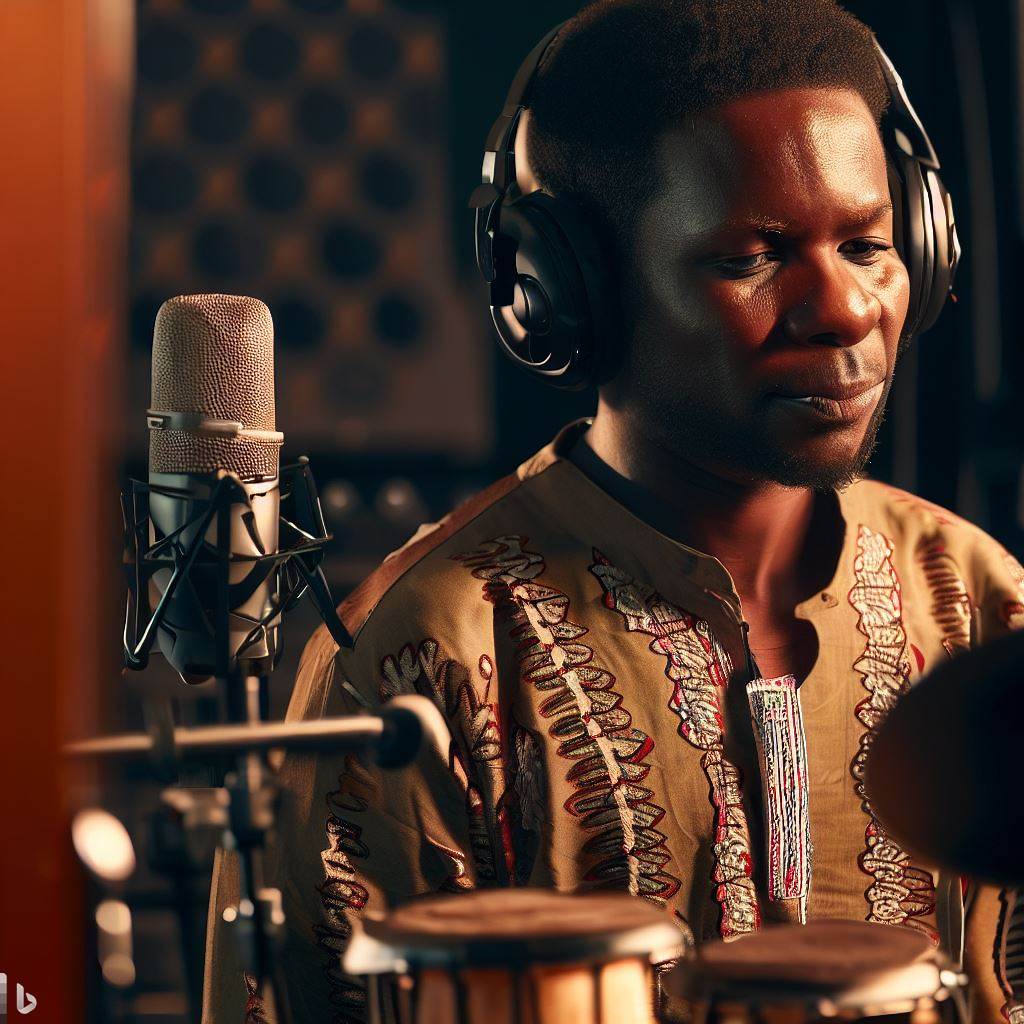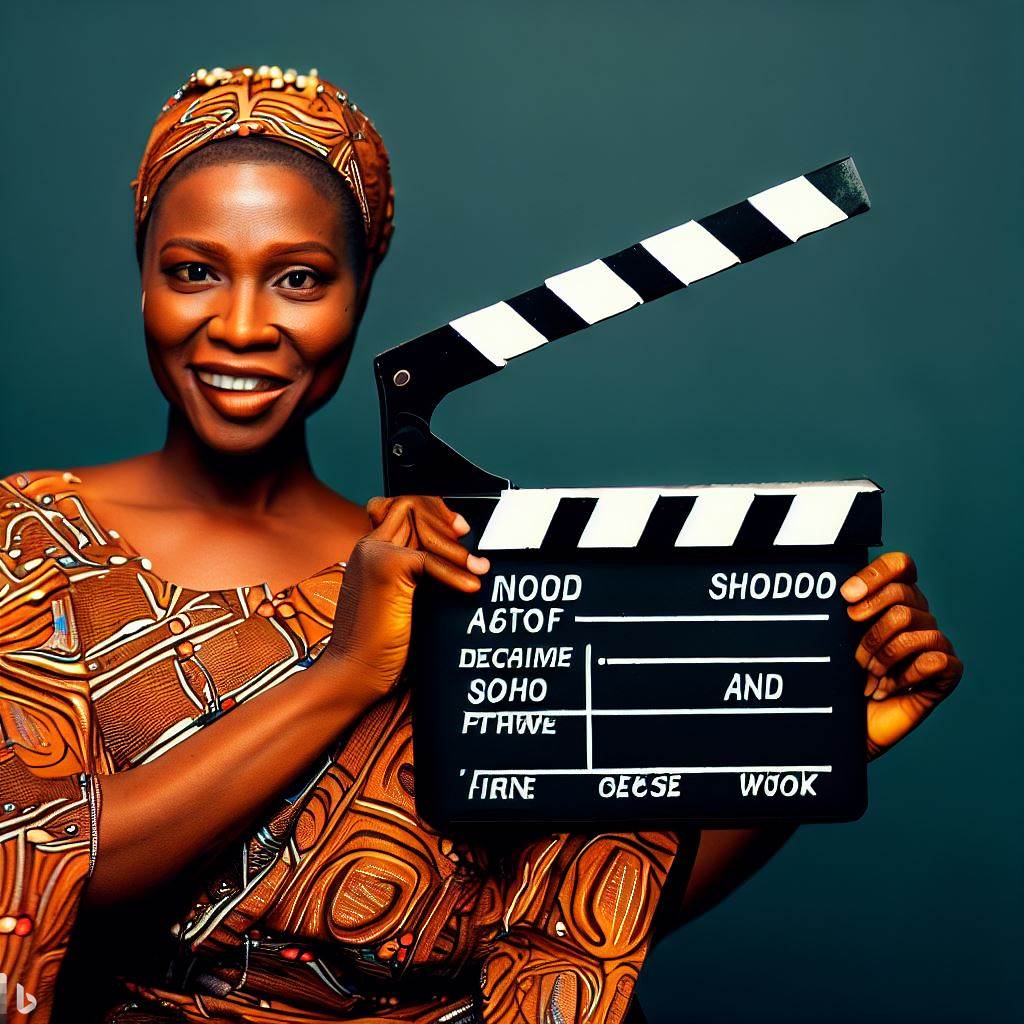Introduction
A Foley artist is someone who creates and records sound effects for movies and television shows.
Their work is crucial in enhancing the realism and immersive experience of a film or TV production.
In Nigeria, there is a growing demand for Foley artists, creating opportunities for aspiring individuals to pursue this career.
Training programs and courses are available in Nigeria to help individuals develop their skills and become professional Foley artists.
These training opportunities not only provide theoretical knowledge but also offer practical hands-on experience.
By enrolling in these programs, aspiring Foley artists can learn the techniques and tools used in the industry.
They can also gain exposure to different genres of film and television production, preparing them for diverse projects.
Furthermore, training programs in Nigeria provide networking opportunities, connecting aspiring artists with industry professionals.
Many training courses also focus on the business aspect of Foley artistry, equipping students with the knowledge to market themselves.
Overall, these training opportunities are vital for aspiring Foley artists in Nigeria to refine their skills, build their portfolios, and establish themselves in the industry.
With the increasing demand for local content production, the need for skilled Foley artists is more important than ever.
By investing in training, aspiring artists can position themselves for success in this exciting and creative field.
Overview of Foley Artistry in Nigeria
A. The current state of Foley artistry in Nigeria
- Foley artistry in Nigeria is still relatively underdeveloped compared to other countries.
- There is a lack of awareness and understanding of the art form in the Nigerian entertainment industry.
- Most Nigerian films and television shows rely on pre-recorded sound effects instead of custom Foley work.
- The limited resources and infrastructure for Foley artistry contribute to the current state.
B. Emerging opportunities and interest in the field
- Despite the challenges, there is a growing interest in Foley artistry within the Nigerian film industry.
- Some production companies and independent filmmakers are recognizing the importance of Foley work.
- The increase in international collaborations has also exposed Nigerian filmmakers to the possibilities of Foley artistry.
- This emerging interest presents new opportunities for aspiring Foley artists in Nigeria.
C. Challenges faced by aspiring Foley artists in Nigeria
- Limited access to formal training and education in Foley artistry.
- Lack of dedicated Foley studios with proper soundproofing and equipment.
- Financial constraints to invest in necessary tools and resources for Foley work.
- Limited career prospects and recognition for Foley artists in Nigeria.
- The competitive nature of the entertainment industry makes it challenging for aspiring artists to secure opportunities.
Despite these challenges, there is hope for aspiring Foley artists in Nigeria.
The growing interest in Foley artistry and the recognition of its importance in the filmmaking process open doors for training opportunities.
Various organizations offer tailored workshops for Foley artistry, such as the Nigerian Sound Design Workshop, providing specialized training.
Aspiring Foley artists gain hands-on experience and learn technical and artistic aspects of sound effects creation.
Collaboration between Nigerian and international Foley artists allows aspiring artists to learn from established professionals.
Despite limited Foley studios in Nigeria, some production companies are investing in sound production facilities with Foley stages.
Financial constraints, equipment costs, and limited recognition are challenges for aspiring Foley artists in Nigeria.
Industry stakeholders should promote Foley artistry’s importance and create avenues for career advancement and recognition.
While Foley artistry in Nigeria is in its early stages, growing interest and emerging opportunities are evident.
Read: Essential Tools for a Foley Artist: Nigerian Perspective
Importance of Professional Training
Training is of utmost importance for aspiring Foley artists in Nigeria, as it equips them with the necessary skills and knowledge to excel in their craft.
A. The need for formal training to excel in Foley artistry
Formal training provides a solid foundation for aspiring Foley artists by teaching them the essential techniques, theories, and industry standards.
It helps them understand the intricacies of sound design and develop their creative abilities.
By enrolling in professional training courses, aspiring Foley artists can learn about different sound effects creation techniques, such as footsteps, object manipulation, and environmental sounds.
They gain practical experience in creating and recording sounds that enhance the audiovisual experience in films, television shows, and other forms of media.
Furthermore, formal training teaches aspiring Foley artists about acoustics, microphone placement, and audio editing.
These technical skills are fundamental in achieving high-quality sound design and communicating the desired emotions and moods in a project.
B. The advantages of receiving professional training
Receiving professional training in Foley artistry offers several advantages for aspiring artists.
Firstly, it provides them with industry-specific knowledge and exposure to the latest techniques and technologies in sound design.
This knowledge is crucial, especially in an era where advancements in audio technology constantly shape the industry landscape.
Secondly, professional training offers aspiring Foley artists the opportunity to collaborate and network with fellow artists and industry professionals.
These connections can lead to future job opportunities, mentorships, and collaborations, helping them establish themselves in the competitive field of sound design.
Moreover, professional training enhances their overall credibility and market value.
Clients and employers often prioritize hiring artists with formal training as it assures them of the candidate’s technical skills and commitment to their craft.
C. Examples of successful Foley artists who have benefited from training
Several successful Foley artists have attributed their achievements to the professional training they received.
One such example is Chioma Nwosu, a renowned Foley artist whose work can be heard in numerous award-winning films.
Nwosu underwent extensive formal training, which allowed him to refine his techniques and develop a unique style that sets him apart in the industry.
Another example is Ifeanyi Ademola, who started her career without any professional training but realized the importance of formal education and subsequently enrolled in a Foley artistry program.
This training not only honed her skills but also opened doors to prestigious projects and recognition within the industry.
These success stories highlight the transformative impact of professional training on aspiring Foley artists’ careers.
It not only helps them gain technical proficiency but also grants them access to a supportive community and valuable opportunities.
Professional training plays a vital role in the journey of aspiring Foley artists in Nigeria. It provides them with the necessary skills, knowledge, and industry exposure to excel in their craft.
By emphasizing the need for formal training, discussing its advantages, and showcasing successful Foley artists who have benefited from training, this section underscores the significance of investing in professional development for individuals passionate about Foley artistry.
Read: Salaries and Career Progression for Foley Artists in Nigeria
Available Training Options in Nigeria
A. Reputable Institutions or Organizations Offering Foley Artistry Training
- Sound Design Academy – This institution offers professional Foley artistry training in Nigeria.
- Lagos School of Media – The school provides specialized courses in Foley artistry for aspiring artists.
- Nigerian Institute of Sound and Film Technology – This institute offers comprehensive training in Foley artistry.
B. Detailed Information on their Training Programs
Sound Design Academy
- Duration: The training program at Sound Design Academy lasts for 3 months.
- Curriculum: The curriculum covers the basics of Foley artistry, sound effects creation, and practical sessions.
- Facilities: Students have access to state-of-the-art recording studios and equipment.
- Certification: Upon completion, students receive a certificate in Foley artistry.
Lagos School of Media
- Duration: The training program at Lagos School of Media spans over 6 months.
- Curriculum: The curriculum includes modules on Foley techniques, sound editing, and post-production.
- Practical Experience: Students work on real film projects for hands-on experience.
- Collaboration: The school partners with production companies for internships and job placements.
Nigerian Institute of Sound and Film Technology
- Duration: The training program at the Nigerian Institute of Sound and Film Technology lasts for 1 year.
- Curriculum: The curriculum covers all aspects of sound production, including Foley artistry.
- Industry Exposure: Students get the opportunity to work alongside experienced Foley artists in real film productions.
- Resources: The institute has a vast library of sound effects and equipment for practical training.
C. Notable Alumni or Success Stories from these Training Programs
Sound Design Academy
- Joseph Oluwaseyi Temitope: After completing the training, Joseph worked on several blockbuster Nigerian movies, earning accolades for his exceptional sound design.
- Adaora Nwokoye: Adaora’s work as a Foley artist was recognized in international film festivals, leading to collaborations with renowned filmmakers.
Lagos School of Media
- Femi Adeyemo: Femi’s expertise in Foley artistry landed him a position in a prominent post-production studio, where he worked on popular TV shows and films.
- Chidinma Ibezim: Chidinma’s dedication and skills in Foley artistry led her to become the go-to Foley artist for Nollywood productions.
Nigerian Institute of Sound and Film Technology
- Emeka Eze: Emeka’s exceptional work in Foley artistry earned him a nomination for the Best Sound Design category at the African Movie Academy Awards.
- Funke Akindele: Funke, a notable Nigerian actress, studied Foley artistry at the Institute, which greatly enhanced her understanding of sound production in films.
Aspiring Foley artists in Nigeria have several reputable training options available to develop their skills and pursue successful careers in the industry.
Institutions such as Sound Design Academy, Lagos School of Media, and the Nigerian Institute of Sound and Film Technology offer comprehensive training programs, providing practical experience and industry exposure.
Many alumni from these programs have achieved notable success in the field, showcasing the effectiveness of the training provided.
Read: Unique Soundscapes: The Role of Foley Artists in Nollywood

Online Training Options
A. Availability and advantages of online training platforms
- Online training platforms provide accessibility and convenience for aspiring Foley artists in Nigeria.
- These platforms offer a wide range of courses, allowing individuals to choose according to their interests and needs.
- Foley artists can learn at their own pace, making online training ideal for those with busy schedules.
- Online platforms often have a supportive community where artists can interact with fellow learners and professionals.
B. Recommendations for online platforms focusing on Foley artistry
- Udemy: Offers various Foley art courses taught by experienced professionals.
- Coursera: Provides online courses from top universities and institutions on sound design and Foley art.
- Pro Tools Expert: Offers comprehensive training in sound design, including Foley techniques.
- LinkedIn Learning: Provides courses on Foley art, sound design, and related topics
C. Success stories from individuals who have undergone online training
- Jane Johnson, a Nigerian aspiring Foley artist, enhanced her skills through online courses on Udemy.
- After completing a Foley art course on Coursera, Samuel Okoye landed a job as a sound designer.
- Michael Adeleke, a self-taught Foley artist, broadened his knowledge through Pro Tools Expert’s online training.
- Ogechi Eze, a successful Foley artist, attests to the effectiveness of LinkedIn Learning in honing her skills.
Networking opportunities and industry events
Networking is crucial in the field of Foley artistry as it helps aspiring artists to connect, collaborate, and learn from experienced professionals.
Attending industry events and workshops in Nigeria provides valuable opportunities to meet fellow artists and industry experts.
Here are some relevant industry events and workshops in Nigeria that aspiring Foley artists can consider:
- Foley Artist Masterclass: This workshop, organized by a renowned sound design studio, offers hands-on training and networking opportunities.
- Nigerian Sound Design Conference: An annual event where Foley artists, sound designers, and industry professionals gather to share knowledge and network.
- Artistic Soundscape Workshop: This interactive workshop focuses on the artistry and techniques of Foley and provides a platform for networking.
- Nigerian Film Sound Summit: A two-day conference that brings together filmmakers, sound designers, and Foley artists to exchange ideas and build connections.
- Africa International Film Festival (AFRIFF): Apart from film screenings, AFRIFF also hosts workshops and networking events for artists in various fields, including Foley artistry.
When it comes to networking effectively, here are some tips and strategies:
- Be prepared: Have your elevator pitch and business cards ready to introduce yourself confidently.
- Attend industry events: Actively participate in workshops, panel discussions, and social events to expand your connections.
- Listen and learn: Engage in meaningful conversations with professionals, ask questions, and absorb knowledge and insights.
- Volunteer or intern: Offer your assistance at sound studios or events to get hands-on experience and make valuable connections.
- Follow up: After meeting someone, send a personalized follow-up email expressing your interest in working together or staying connected.
- Join online communities: Engage in Foley artist forums, social media groups, and online platforms to connect with artists globally.
Grants and Funding for Aspiring Foley Artists
A. Available Grants and Funding Opportunities for Aspiring Foley Artists in Nigeria
- The Afolayan Foundation offers grants specifically designed for aspiring Foley artists in Nigeria.
- Fraser Institute provides funding support to talented individuals pursuing a career in Foley art.
B. Application Processes and Requirements for Grant and Funding Opportunities
- To apply for The Afolayan Foundation’s grant, aspiring Foley artists must submit a detailed project proposal.
- The proposal must include a comprehensive budget plan and a timeline for the training program.
- Applicants must also provide their background and previous experience in sound production.
- Fraser Institute requires aspiring Foley artists to fill out an online application form on their website.
- Along with the application form, a portfolio showcasing previous work and a personal statement must be submitted.
- Both The Afolayan Foundation and Fraser Institute have strict deadlines for grant applications.
- It is essential for applicants to carefully follow the guidelines mentioned on the respective websites.
C. Success Stories of Individuals Who Received Grants or Funding for Training
- Jane Olisakwe, a young aspiring Foley artist, received a grant from The Afolayan Foundation and successfully underwent extensive training.
- With the funding provided by Fraser Institute, Peter Durojaye, a talented sound enthusiast, pursued specialized Foley art courses.
- As a result of the grants they received, both Jane Olisakwe and Peter Durojaye were able to attend workshops and learn from renowned Foley artists.
- Jane Olisakwe now works as a professional Foley artist and has contributed to several Nigerian films and television shows.
- Peter Durojaye’s training was instrumental in gaining recognition in the industry, and he now collaborates with top filmmakers in Nigeria.
- These success stories highlight the effectiveness of grants and funding in nurturing aspiring Foley artists.
- The support provided through grants and funding plays a crucial role in the development of the Foley art scene in Nigeria.
Aspiring Foley artists in Nigeria have access to various grants and funding opportunities. The Afolayan Foundation and Fraser Institute are two notable organizations providing financial support for training programs.
Applicants must carefully adhere to the application processes and requirements specified by these institutions.
The success stories of Jane Olisakwe and Peter Durojaye demonstrate the positive impact of grants and funding in shaping the careers of Foley artists.
With continued support, the Foley art scene in Nigeria will flourish, contributing to the growth of the Nigerian film and television industry.
Conclusion
Training opportunities are crucial for aspiring Foley artists in Nigeria, as they provide necessary skills and knowledge.
Aspiring Foley artists should actively explore the available options and chase their passion relentlessly.
Remember, pursuing your dreams as a Foley artist may be challenging, but with dedication and perseverance, success is attainable. Keep creating and never give up!




